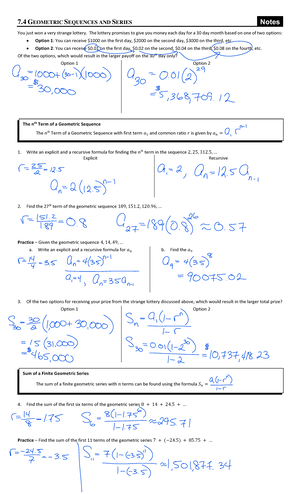- Information
- AI Chat
Was this document helpful?
Advice - ....
Subject: Pre-Calculus
397 Documents
Students shared 397 documents in this course
Level:
Standard
Was this document helpful?

General Preparation Advice
1. Make sure you are comfortable with high school mathematics. Canadian Senior Mathematics
Contest (CSMC) and Euclid problems use ideas from all areas of high school mathematics
except for calculus and vectors. The toolkits provided in these preparation materials cover
some of the major topic areas. If you need help in reviewing some high school topics, a great
resource is the CEMC courseware. The Grades 9/10/11 Mathematics and Advanced Functions
& Pre-Calculus courseware will be the most helpful.
•Grades 9/10/11 - The Curriculum Maps page contains documents that provide you with
a complete list of all the lessons along with the lesson goals. These documents will help
you find the topic you are looking for.
•Advanced Functions and Pre-Calculus - Use the unit headings and individual lesson de-
scriptions to find the topic you are looking for.
2. Be prepared to write complete, clear solutions to the contest problems. This aspect becomes
increasingly important in the later questions of the contests. CSMC and Euclid questions come
in two types: short answer questions and full solution questions.
•Short answer questions come with a box where you place your final answer. If you have
the correct answer in the box, you will earn full marks. If you do not have the correct
answer in the box, part marks will be awarded for relevant work shown. Do not spend a
lot of time writing long solutions to these problems. But do make sure that the work you
show is clear.
•Full solution questions include marks for completeness, clarity and style of presentation,
so take care in writing up your solution. Here are some tips to writing a solution.
–Use words! You do not need to use full sentences, but words can make things clearer.
–If you introduce variables, be clear about what those variables represent.
–Organize your work. Separate your rough work from your actual solution, and consider
using a separate piece of paper for rough work. Sometimes a table or headings can
add clarity to your solution.
–Justify your steps and include explanations. You do not need to explain every little
detail, but your reader should be able to follow your argument.
3. Keep your eye on the time. The CSMC contest lasts 2 hours and the Euclid contest lasts 2.5
hours. Do not get bogged down on one problem. If you find yourself spending more than 5
minutes on a problem without making any progress, put a star on the problem (so you can
easily find it later) and move on to the next problem.
The Euclid contest is designed so that the questions get harder as you progress through the
contest. However, difficulty is not universal. You may find some topics easier than others, so
do not always assume that you will find the next question harder. Part (a) on questions 9 and
10 may be easier than question 8, as part (a) of these questions are often designed to help you
understand the question or help you with the later parts of the question.
The CSMC contest is designed so that the questions get harder as you progress through the
six short answer questions in part A. The difficulty level then resets with Part B. The first full







